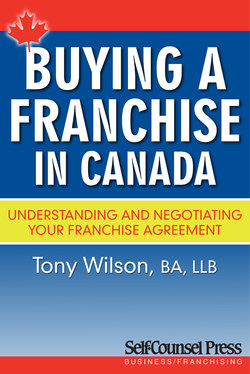Читать книгу Buying a Franchise in Canada - Tony Wilson - Страница 14
На сайте Литреса книга снята с продажи.
8. Good Faith, Fairness, and Reasonableness
ОглавлениеThe Ontario, PEI, and Alberta franchise laws impose a statutory duty of fair dealing in the performance and enforcement of the franchise agreement. The other provinces do not have such legislation but case law (that is, judge-made law) would indicate that there is a “common law” duty of good faith and fair dealing in some provinces, but the law is somewhat divided on this point.
It’s important to note that it’s not just the franchisor who must deal fairly with the franchisee. The franchisee must deal fairly with the franchisor as well. In my experience, there are ample cases of franchisees acting unfairly to the franchisor, underreporting or withholding royalties, deliberately not following the system, and carrying on the business in more or less permanent state of “cold war” with the franchisor. In other words, there are bad apples and bad actors among franchisees. Fairness and good faith, then, work in both ways. Franchisees who act unfairly and in bad faith will (and should) face the same legal sanctions as franchisors who do.
Regardless of whether you have an issue with the franchisor over some element of the franchise system you don’t like, such as new requirements by the franchisor, interpretation of the operations manual, or for any other reason, withholding royalties, underreporting gross sales, undermining the franchised system, or misrepresenting information may well breach this duty of fair dealing as well as breach the franchise agreement. If it comes to litigation, such tactics won’t look good in court and may well exacerbate your legal situation. Both you and the franchisor must act fairly under the agreement towards each other. You must take the high road.
While acting for franchisees “discussing” the franchise agreement before it is signed, I have, in some cases, been able to persuade franchisors to add a provision to their agreement to the effect that “the parties will deal with each other fairly and in good faith.” “If it’s the law anyway,” I argue, with only a touch of embellishment, “why not state it in the agreement?”
If they aren’t prepared to do this, my polite and measured response is: “Sorry, did I hear you correctly? You’ve made all sorts of representations and provided all sorts of comfort to my client about how fabulous this franchise is, how great the location is, how good the other franchisees in the system are, how successful the system is, and how you see the franchisees as your ‘partners’ and your ‘family,’ but you won’t covenant in the agreement to treat the franchisee fairly and in good faith? Did I hear that correctly? Does that mean you want the right to treat them unfairly and in bad faith?”
I’m happy that most franchisors who I’ve “discussed” this with will agree to such a request. It needn’t be done in the body of the agreement. It can be done in an addendum to the agreement (an addendum being a modification to the franchise agreement that forms a part of the agreement and is usually attached at the end of the document). It can also be in the form of a “letter agreement” as long as it’s signed by both parties and acknowledged to be a modification of the agreement.
Although what might be called the standard Canadian form of franchise agreement usually provides for the franchisor acting reasonably in most circumstances in which it can exercise discretion (e.g., “the franchisor, acting reasonably shall … ” or “subject to the reasonable approval of the franchisor”) there may be issues in which you may want to add “reasonableness” language (e.g., “the franchisor, acting reasonably shall … ” or “the parties, each acting reasonably and in good faith, shall … ”). Remember, pick carefully and don’t nitpick!
